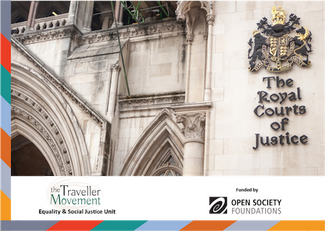Know Your Rights – Race Discrimination in Goods and Services

Most people know injustice when they see it, but not everyone knows what can be done to combat it. In this new series, Joanna and Geraldine from The Traveller Movement will look at how the law can be used to challenge inequality and unfair treatment in society. First up: race discrimination in goods and services.
‘A Gypsy is closely followed by the security guard while she walks around a shop. The security guard does not follow anyone else in the same way.’
‘A Traveller family are booking a restaurant for dinner. The manager refuses the booking, saying “we’ve had a lot of problems with Travellers recently”’.
Did you know that this kind of behaviour is unlawful? That it is against a law called the Equality Act 2010?
EQUALITY ACT 2010
Discrimination means treating you unfairly because of who you are. The Equality Act 2010 protects you against discrimination from:
1.) Businesses and organisations which provide goods or services like pubs, restaurants, shops, banks, and utility (gas, water or electricity) companies
2.) Someone you rent or buy a property from like housing associations or site providers
3.) Health and care providers like doctors, hospitals and care homes
4.) Employers
5.) Schools, colleges and other education providers
6.)Transport services like buses, trains and taxis
7.) Public bodies like government departments, police, social services and local authorities.
8.) The Equality Act says that no one can be treated worse than another person in a similar situation because of their:
9.) Race (which includes ethnic origin such as being a Gypsy, Traveller or a Roma person)
10.) Age
11.) Disability
12.) Gender reassignment
13.) Marriage or civil partnership (in employment only)
14.) Pregnancy and maternity
15.) Religion or belief
16.) Sex
17.) Sexual orientation
Discrimination on one of the grounds protected by the Equality Act is unlawful. This means you can take action in the courts against the person, business or organisation that has treated you unfairly. This article will focus on one of these grounds: race discrimination.
There are four main types of race discrimination:
Direct discrimination
Direct discrimination happens when someone treats you worse than another person in a similar situation because you are a Gypsy, Traveller or Roma person.
EXAMPLES:
a.) A shop refuses to give a Traveller credit because she lives on a caravan site.
b.) A wedding venue charges a Gypsy couple more than it charges other couples.
c.) A youth club has different opening times for Roma and non-Roma children.

Indirect discrimination
This happens when a service provider has a way of working which puts Gypsies, Travellers or Roma people at a disadvantage.
EXAMPLE:
a.) A holiday park only accepts guests who are on the electoral register. This rule applies to all customers but as Gypsies, Travellers and Roma people are less likely to be on the electoral register, they’ll find it more difficult to book a holiday.
b.) Sometimes people are allowed to discriminate against you if they have a good enough reason for doing so. They would need to be able to prove this in court, if necessary. This is known in legal language as objective justification. If the discrimination is justified, it is not unlawful under the Equality Act.
c.) A service provider can still tell you what kind of behavior they want from you as a customer, such as when a “smart” restaurant requires its customers to dress smartly, or a pub refuses to serve customers who are drunk.
Harassment
Harassment is unwanted behaviour which you find offensive, frightening, humiliating or upsetting. This could be spoken or written words, physical gestures, facial expressions or jokes.
EXAMPLE:
A Gypsy woman waiting to see her doctor overhears the receptionists making racist jokes about her. She feels humiliated and upset.
Victimisation
Victimisation happens when a service provider treats you badly because you complained about discrimination. It can also occur if you are supporting someone else who has made a complaint of race related discrimination.
EXAMPLE:
A man is turned away from a pub because he is a Traveller. His friend complains that this is discrimination and is turned away too.

WHAT CAN BE DONE?
You can complain to the person or business that has treated you unfairly. They may apologise or change their way of working so that other people don’t have to go through what you did.
If you are not happy with their response, you can take a legal complaint of unlawful discrimination in the county court under the Equality Act. This is what The Traveller Movement did when we were turned away from Wetherspoons a few years ago.
Going to court can be a long and stressful process. It can also be expensive. It’s important to keep in mind that if you lose the case, you may have to pay the legal costs of the person or business you are suing.
There are strict time limits for going to court. You need to make your claim within 6 months less one day of the incident of discrimination.
IF YOU THINK YOU HAVE EXPERIENCED UNLAWFUL DISCRIMINATION
Ask for the NAMES of the people involved: for example, the barman who refused you service and the name of his manager; the shopkeeper who refused you credit; the name of the receptionists and the doctor’s surgery where you were harassed, etc.
RECORD what happened: As soon as you can, write down or record on your mobile phone:
When it happened
What happened
Who did it
Where it happened
The name and, if possible, the contact details of anyone who witnessed the incident
REMEMBER THE TIME LIMIT; ACT QUICKLY!
You can make a complaint to the service provider yourself, or you can get advice from a lawyer, a community group, the Citizens’ Advice Bureau, or contact The Traveller Movement on 020 7607 2002 or esju@travellermovement.org.uk.